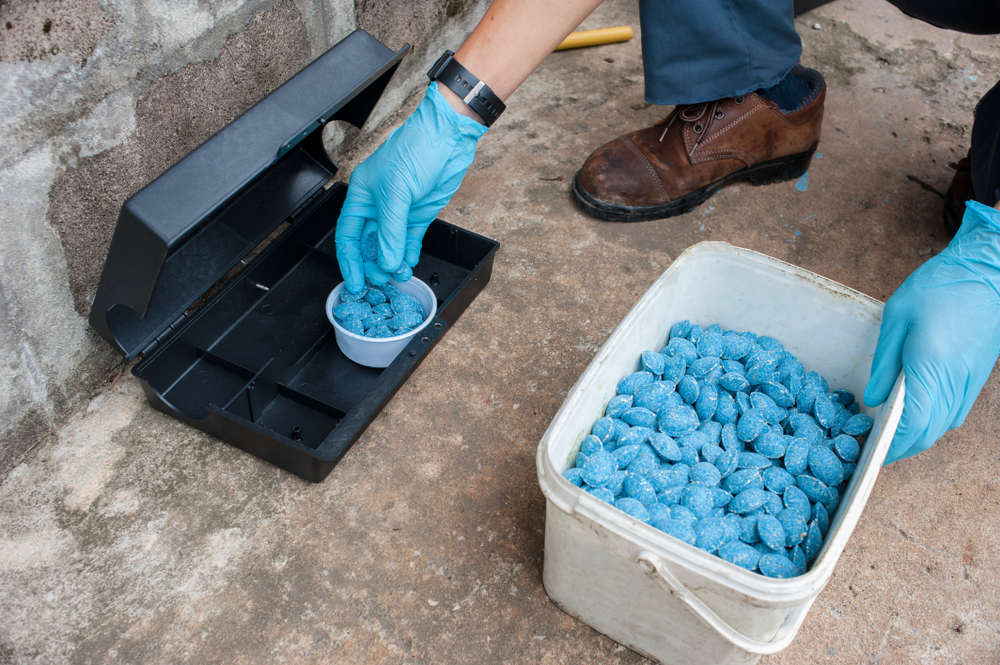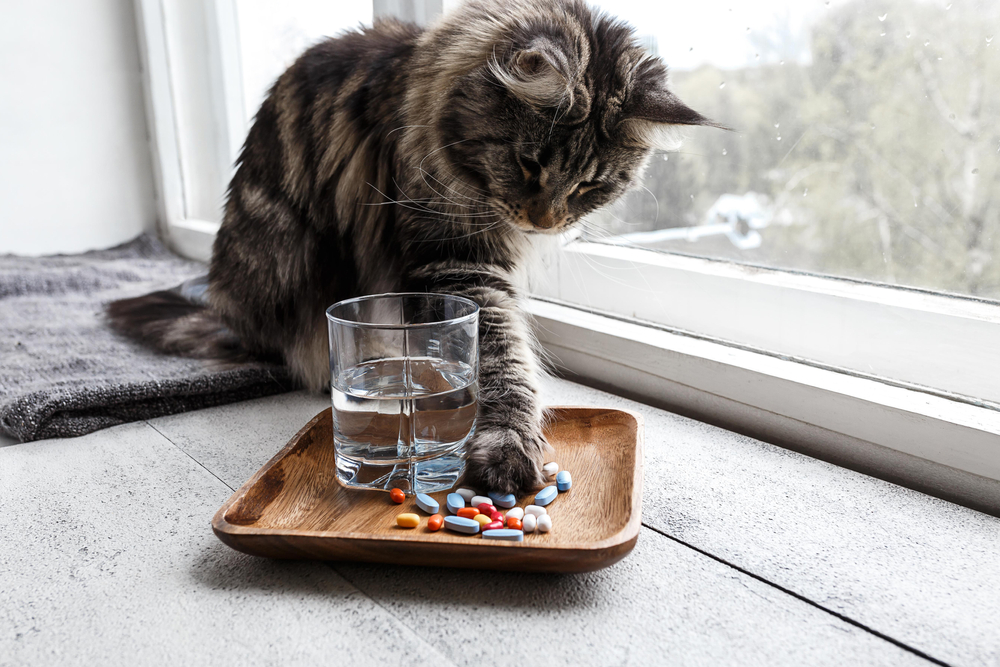Your pet uses their mouth to explore their world, but this tendency can lead them to accidentally ingest a toxic substance. Our team at The Pet Clinic of Salem compiled a list of some common pet toxins, to help you ensure your pet stays safe from these items commonly found in and around your home.
#1: Over-the-counter medications can be toxic to pets
Pets are not small people, and they cannot handle many over-the-counter (OTC) medications that are safe for people. These include:
- Non steroidal anti-inflammatory drugs (NSAIDs) — NSAIDs, such as Motrin, Advil, and Aleve, act by inhibiting cyclooxygenase (COX) enzymes, which normally protect the mucosal lining of the gastrointestinal tract, maintain sufficient kidney perfusion, and help regulate platelet function. In pets, these medications are absorbed more quickly and metabolized more slowly, leading to issues such as ulcerations inside the gastrointestinal tract, kidney damage, and bleeding abnormalities.
- Acetaminophen — Pets aren’t able to metabolize acetaminophen effectively, making them vulnerable to poisoning. The drug can cause liver damage, and can also reduce red blood cells’ ability to carry oxygen.
- Decongestant medication — Medications containing pseudoephedrine or phenylephrine can cause hyperactivity, increased heart rate, seizures, and respiratory and cardiac failure.
- Aspirin — At high doses, aspirin causes severe side effects, such as vomiting, diarrhea, hemorrhaging, seizures, and coma.
#2: Human prescription medications can be toxic to pets
The Pet Poison Helpline lists several human prescription medications on their top 10 pet toxicities list, including:
- Antidepressants — If ingested in high doses, certain antidepressants can cause a serotonin buildup in your pet’s blood stream, leading to tremors, incoordination, seizures, hyperactivity, elevated body temperature, and dangerously high heart rate.
- Attention deficit/hyperactivity disorder medication (ADHD) — Pets are extremely sensitive to ADHD medications, and low doses can cause tremors, seizures, and dangerously elevated heart rate and body temperature.
- Blood pressure medications — Beta-blockers used to treat high blood pressure are especially dangerous for pets, causing a life threatening drop in blood pressure and heart rate.
- Sleep aids — Ingestion can cause severe lethargy and incoordination in pets, and also agitation, hyperactivity, and tremors in some cases. In addition, some sleep aids cause liver damage in cats.
#3: Human food can be toxic to pets
Several common foods found in your pantry are toxic to pets, including:
- Chocolate — This sweet treat contains caffeine and theobromine, which stimulate the central nervous system in pets, causing vomiting, diarrhea, restlessness, tremors, and seizures. Cocoa powder and unsweetened baker’s chocolate are the most toxic.
- Onions — Vegetables in the Allium family, including onions, garlic, leeks, and chives, contain a toxin called N-propyl disulphide, which breaks down your pet’s red blood cells, leading to anemia.
- Grapes — Grapes and raisins contain an unknown toxin that causes kidney failure in pets.
- Macadamia nuts — Macadamia nuts contain an unknown toxin that causes vomiting, ataxia, weakness, and hyperthermia in pets.
- Xylitol — This common artificial sweetener causes a dose-dependent insulin release in pets, resulting in a profound drop in glucose levels. Signs include incoordination, lethargy, and seizures.
#4: Veterinary medications can be toxic to pets
Medications prescribed to your pet can be dangerous if your pet is overdosed. Chewable medications are designed to be palatable for your pet, but if they eat the entire package, they could be in danger. Certain dog breeds, including the collie, Sheltie, Australian shepherd, German shepherd, and Border collie, are particularly sensitive to ivermectin, which is found in some heartworm preventives.
#5: Plants can be toxic to pets
Plants found in floral arrangements, planters, and flower beds can be toxic to pets. These include:
- Autumn crocus — This plant contains an alkaloid called colchicine that is highly toxic to pets, and causes severe gastrointestinal signs, liver and kidney damage, respiratory failure, and seizures.
- Lilies — Lilies are particularly dangerous for cats, and, if ingested, can cause severe kidney failure. The entire lily plant is toxic, including the stem, leaves, flowers, pollen, and the vase water. Lilies can also cause gastrointestinal upset in dogs.
- Tulips — Tulips contain toxic glycosides that, when chewed and swallowed, severely irritate the mouth and gastrointestinal tract, causing signs including drooling, vomiting, and diarrhea.
- Daffodils — Daffodils contain toxic alkaloids called lycorines that cause vomiting, hypersalivation, diarrhea, tremors, and cardiac arrhythmias in pets.
#6: Pesticides can be toxic to pets

Products you keep around your home to ward off nuisance pests can be harmful to your pet.
- Rodenticides — Many types of rodenticides are available, and most are dangerous for your pet. These include:
- Zinc, calcium, and aluminum phosphides — These products release phosphide gasses inside your pet, leading to painful abdominal distention, and liver damage.
- Bromethalin — These products cause deadly swelling in the brain. Cats are especially sensitive to bromethalin.
- Cholecalciferol — These products work by increasing calcium and phosphorus levels, which causes acute kidney failure.
- Anticoagulants — These products prevent blood from clotting, leading to your pet bleeding out. An anticoagulant antidote is available if the diagnosis is made in the early stages.
- Insecticides — Insecticides, such as organophosphates and carbamate, inhibit cholinesterases and acetylcholinesterases, which are essential enzymes in the body. If ingested by your pet, signs include vomiting, diarrhea, muscle tremors, hypersalivation, and seizures.
Taking precautions to keep your pet away from these common household items will help ensure they don’t ingest a poisonous substance. However, if you know or suspect your pet has swallowed a toxic substance, contact our team at The Pet Clinic of Salem or Animal Poison Control, to determine the necessary course of action.







Leave A Comment